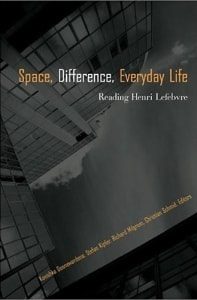
In the past fifteen years, Henri Lefebvre’s reputation has catapulted into the stratosphere, and he is now considered an equal to some of the greats of European social theory (Bourdieu, Deleuze, Harvey). In particular, his work has revitalized urban studies, geography and planning via concepts like; the social production of space, the right to the city, everyday life, and global urbanization. Lefebvre’s massive body of work has generated two main schools of thought: one that is political economic, and another that is more culturally oriented and poststructuralist in tone. Space, Difference, and Everyday Life merges these two schools of thought into a unified Lefebvrian approach to contemporary urban issues and the nature of our spatialized social structures.
Christian Schmid: Stadt, Raum und Gesellschaft:
Henri Lefebvre und die Theorie der Produktion des Raumes,
2. Aufl., Stuttgart : Franz Steiner, 2010
344 S., 2 s/w Abb.
Kartoniert
ISBN 978–3‑515–09691‑1